Corporation Law Report: Shareholder Rights, Dividends, Buybacks
VerifiedAdded on 2020/03/28
|7
|1557
|39
Report
AI Summary
This report analyzes key aspects of corporation law, focusing on shareholder rights, dividends, and capital reduction within the context of the Corporation Act 2001. The report begins with a case study involving Mario and his siblings, addressing a dispute over dividend payments to A Class shareholders and the potential for legal action. It examines the board's breach of duties under the Act and the rights of shareholders. The second question explores share buybacks as a strategy for FWPL to address shareholder dissatisfaction, detailing the process and its implications for share prices. Finally, the report investigates the possibility of reducing capital to eliminate A Class shares, outlining the legal requirements and procedures, including the need for fair and reasonable grounds and the notification process. The report references key sections of the Corporation Act and relevant legal literature to support its arguments.
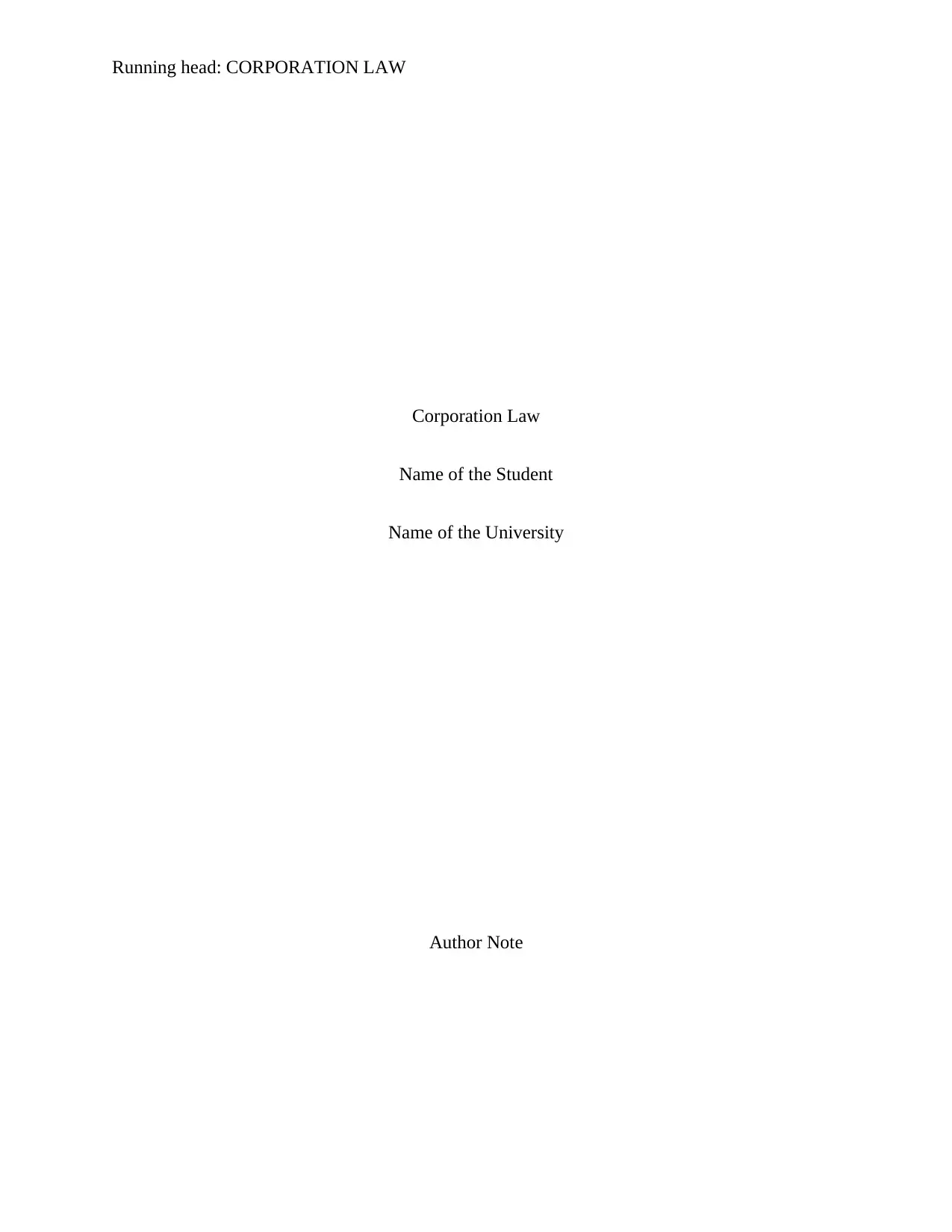
Running head: CORPORATION LAW
Corporation Law
Name of the Student
Name of the University
Author Note
Corporation Law
Name of the Student
Name of the University
Author Note
Paraphrase This Document
Need a fresh take? Get an instant paraphrase of this document with our AI Paraphraser
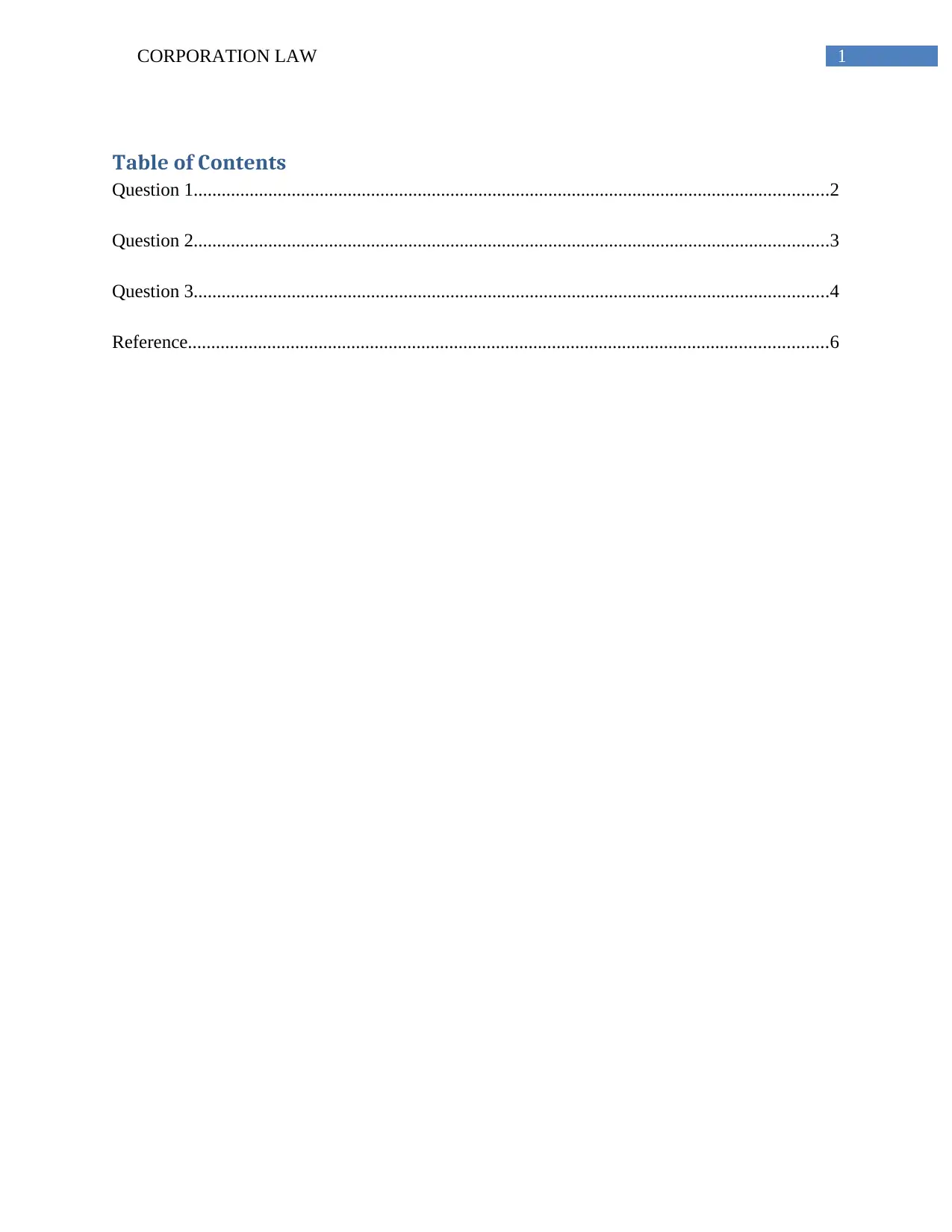
1CORPORATION LAW
Table of Contents
Question 1........................................................................................................................................2
Question 2........................................................................................................................................3
Question 3........................................................................................................................................4
Reference.........................................................................................................................................6
Table of Contents
Question 1........................................................................................................................................2
Question 2........................................................................................................................................3
Question 3........................................................................................................................................4
Reference.........................................................................................................................................6
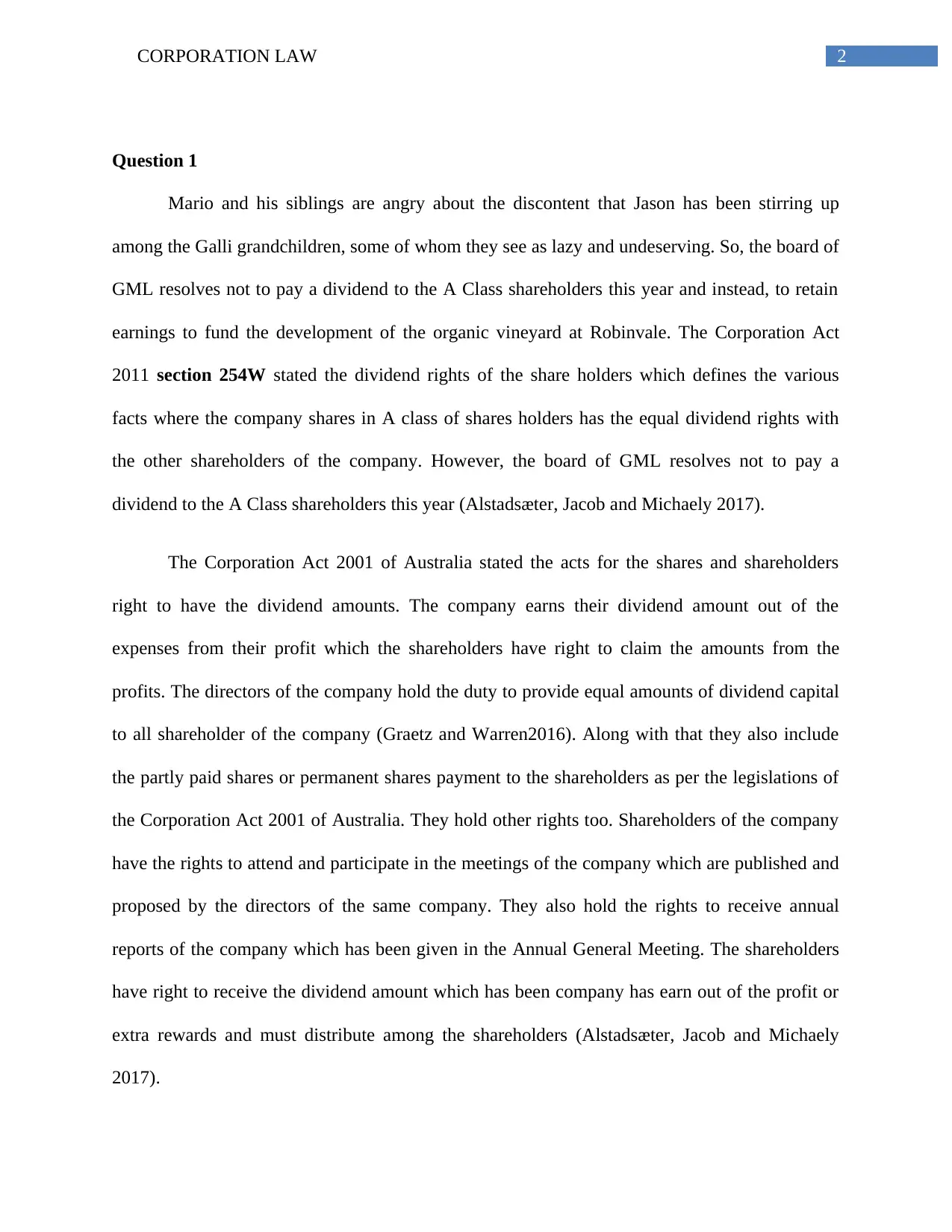
2CORPORATION LAW
Question 1
Mario and his siblings are angry about the discontent that Jason has been stirring up
among the Galli grandchildren, some of whom they see as lazy and undeserving. So, the board of
GML resolves not to pay a dividend to the A Class shareholders this year and instead, to retain
earnings to fund the development of the organic vineyard at Robinvale. The Corporation Act
2011 section 254W stated the dividend rights of the share holders which defines the various
facts where the company shares in A class of shares holders has the equal dividend rights with
the other shareholders of the company. However, the board of GML resolves not to pay a
dividend to the A Class shareholders this year (Alstadsæter, Jacob and Michaely 2017).
The Corporation Act 2001 of Australia stated the acts for the shares and shareholders
right to have the dividend amounts. The company earns their dividend amount out of the
expenses from their profit which the shareholders have right to claim the amounts from the
profits. The directors of the company hold the duty to provide equal amounts of dividend capital
to all shareholder of the company (Graetz and Warren2016). Along with that they also include
the partly paid shares or permanent shares payment to the shareholders as per the legislations of
the Corporation Act 2001 of Australia. They hold other rights too. Shareholders of the company
have the rights to attend and participate in the meetings of the company which are published and
proposed by the directors of the same company. They also hold the rights to receive annual
reports of the company which has been given in the Annual General Meeting. The shareholders
have right to receive the dividend amount which has been company has earn out of the profit or
extra rewards and must distribute among the shareholders (Alstadsæter, Jacob and Michaely
2017).
Question 1
Mario and his siblings are angry about the discontent that Jason has been stirring up
among the Galli grandchildren, some of whom they see as lazy and undeserving. So, the board of
GML resolves not to pay a dividend to the A Class shareholders this year and instead, to retain
earnings to fund the development of the organic vineyard at Robinvale. The Corporation Act
2011 section 254W stated the dividend rights of the share holders which defines the various
facts where the company shares in A class of shares holders has the equal dividend rights with
the other shareholders of the company. However, the board of GML resolves not to pay a
dividend to the A Class shareholders this year (Alstadsæter, Jacob and Michaely 2017).
The Corporation Act 2001 of Australia stated the acts for the shares and shareholders
right to have the dividend amounts. The company earns their dividend amount out of the
expenses from their profit which the shareholders have right to claim the amounts from the
profits. The directors of the company hold the duty to provide equal amounts of dividend capital
to all shareholder of the company (Graetz and Warren2016). Along with that they also include
the partly paid shares or permanent shares payment to the shareholders as per the legislations of
the Corporation Act 2001 of Australia. They hold other rights too. Shareholders of the company
have the rights to attend and participate in the meetings of the company which are published and
proposed by the directors of the same company. They also hold the rights to receive annual
reports of the company which has been given in the Annual General Meeting. The shareholders
have right to receive the dividend amount which has been company has earn out of the profit or
extra rewards and must distribute among the shareholders (Alstadsæter, Jacob and Michaely
2017).
⊘ This is a preview!⊘
Do you want full access?
Subscribe today to unlock all pages.

Trusted by 1+ million students worldwide
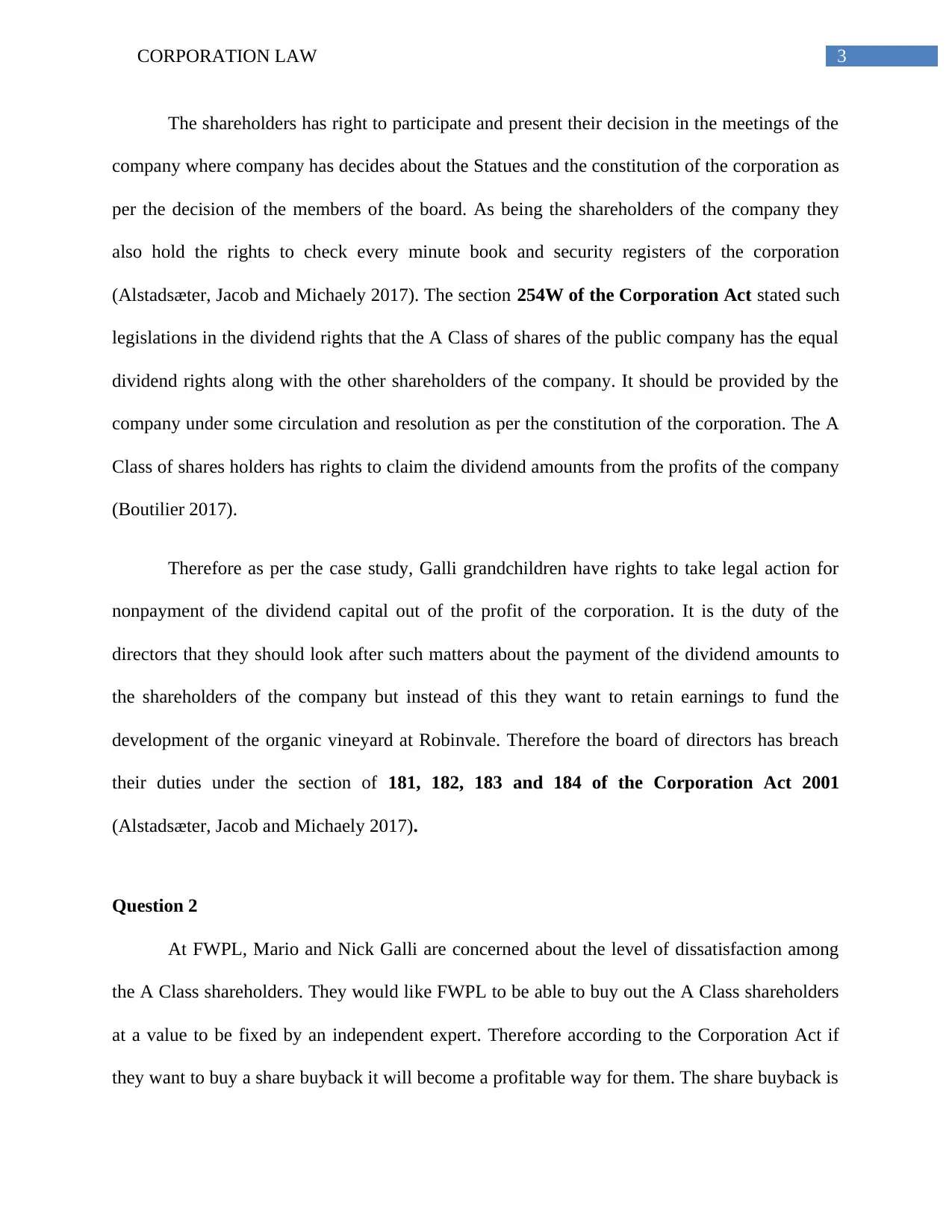
3CORPORATION LAW
The shareholders has right to participate and present their decision in the meetings of the
company where company has decides about the Statues and the constitution of the corporation as
per the decision of the members of the board. As being the shareholders of the company they
also hold the rights to check every minute book and security registers of the corporation
(Alstadsæter, Jacob and Michaely 2017). The section 254W of the Corporation Act stated such
legislations in the dividend rights that the A Class of shares of the public company has the equal
dividend rights along with the other shareholders of the company. It should be provided by the
company under some circulation and resolution as per the constitution of the corporation. The A
Class of shares holders has rights to claim the dividend amounts from the profits of the company
(Boutilier 2017).
Therefore as per the case study, Galli grandchildren have rights to take legal action for
nonpayment of the dividend capital out of the profit of the corporation. It is the duty of the
directors that they should look after such matters about the payment of the dividend amounts to
the shareholders of the company but instead of this they want to retain earnings to fund the
development of the organic vineyard at Robinvale. Therefore the board of directors has breach
their duties under the section of 181, 182, 183 and 184 of the Corporation Act 2001
(Alstadsæter, Jacob and Michaely 2017).
Question 2
At FWPL, Mario and Nick Galli are concerned about the level of dissatisfaction among
the A Class shareholders. They would like FWPL to be able to buy out the A Class shareholders
at a value to be fixed by an independent expert. Therefore according to the Corporation Act if
they want to buy a share buyback it will become a profitable way for them. The share buyback is
The shareholders has right to participate and present their decision in the meetings of the
company where company has decides about the Statues and the constitution of the corporation as
per the decision of the members of the board. As being the shareholders of the company they
also hold the rights to check every minute book and security registers of the corporation
(Alstadsæter, Jacob and Michaely 2017). The section 254W of the Corporation Act stated such
legislations in the dividend rights that the A Class of shares of the public company has the equal
dividend rights along with the other shareholders of the company. It should be provided by the
company under some circulation and resolution as per the constitution of the corporation. The A
Class of shares holders has rights to claim the dividend amounts from the profits of the company
(Boutilier 2017).
Therefore as per the case study, Galli grandchildren have rights to take legal action for
nonpayment of the dividend capital out of the profit of the corporation. It is the duty of the
directors that they should look after such matters about the payment of the dividend amounts to
the shareholders of the company but instead of this they want to retain earnings to fund the
development of the organic vineyard at Robinvale. Therefore the board of directors has breach
their duties under the section of 181, 182, 183 and 184 of the Corporation Act 2001
(Alstadsæter, Jacob and Michaely 2017).
Question 2
At FWPL, Mario and Nick Galli are concerned about the level of dissatisfaction among
the A Class shareholders. They would like FWPL to be able to buy out the A Class shareholders
at a value to be fixed by an independent expert. Therefore according to the Corporation Act if
they want to buy a share buyback it will become a profitable way for them. The share buyback is
Paraphrase This Document
Need a fresh take? Get an instant paraphrase of this document with our AI Paraphraser
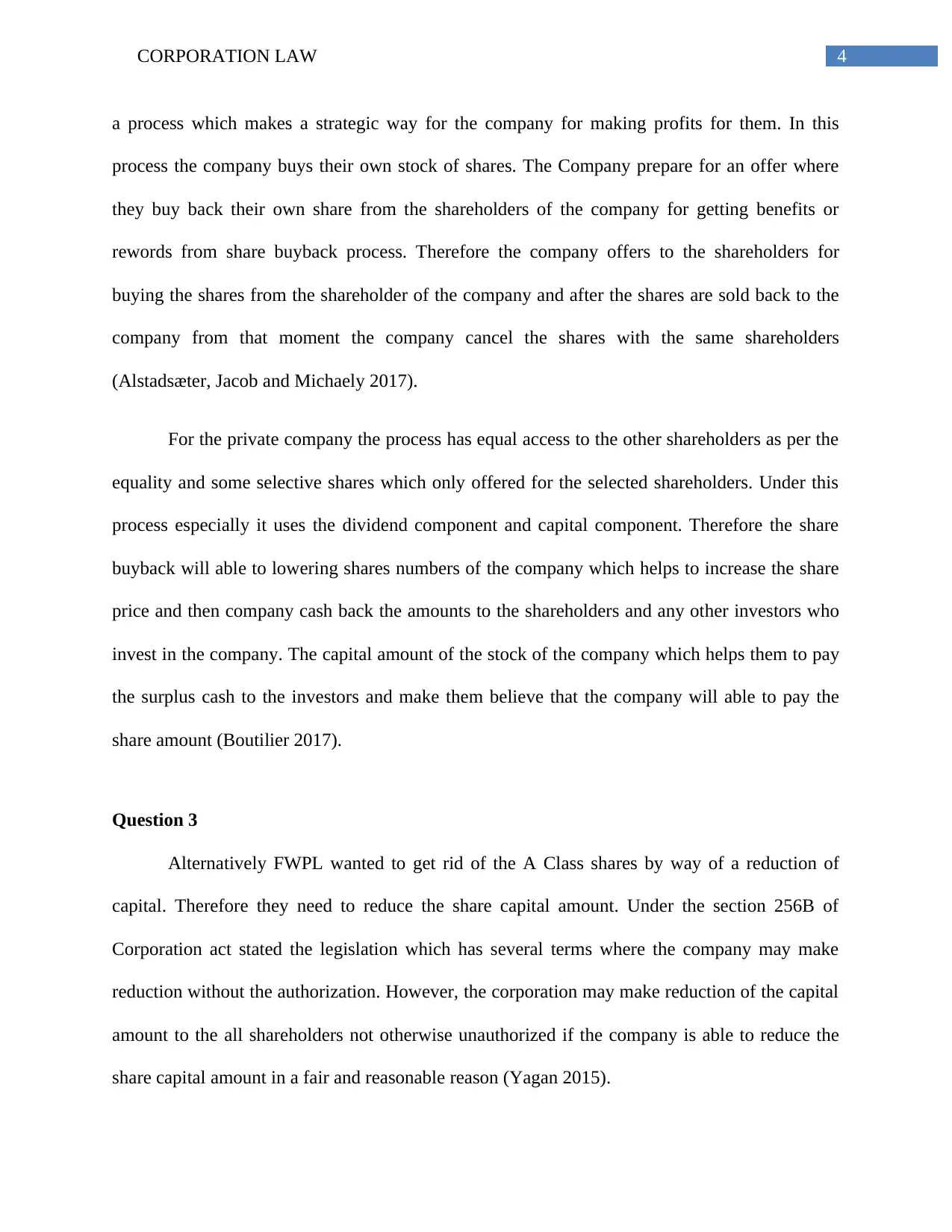
4CORPORATION LAW
a process which makes a strategic way for the company for making profits for them. In this
process the company buys their own stock of shares. The Company prepare for an offer where
they buy back their own share from the shareholders of the company for getting benefits or
rewords from share buyback process. Therefore the company offers to the shareholders for
buying the shares from the shareholder of the company and after the shares are sold back to the
company from that moment the company cancel the shares with the same shareholders
(Alstadsæter, Jacob and Michaely 2017).
For the private company the process has equal access to the other shareholders as per the
equality and some selective shares which only offered for the selected shareholders. Under this
process especially it uses the dividend component and capital component. Therefore the share
buyback will able to lowering shares numbers of the company which helps to increase the share
price and then company cash back the amounts to the shareholders and any other investors who
invest in the company. The capital amount of the stock of the company which helps them to pay
the surplus cash to the investors and make them believe that the company will able to pay the
share amount (Boutilier 2017).
Question 3
Alternatively FWPL wanted to get rid of the A Class shares by way of a reduction of
capital. Therefore they need to reduce the share capital amount. Under the section 256B of
Corporation act stated the legislation which has several terms where the company may make
reduction without the authorization. However, the corporation may make reduction of the capital
amount to the all shareholders not otherwise unauthorized if the company is able to reduce the
share capital amount in a fair and reasonable reason (Yagan 2015).
a process which makes a strategic way for the company for making profits for them. In this
process the company buys their own stock of shares. The Company prepare for an offer where
they buy back their own share from the shareholders of the company for getting benefits or
rewords from share buyback process. Therefore the company offers to the shareholders for
buying the shares from the shareholder of the company and after the shares are sold back to the
company from that moment the company cancel the shares with the same shareholders
(Alstadsæter, Jacob and Michaely 2017).
For the private company the process has equal access to the other shareholders as per the
equality and some selective shares which only offered for the selected shareholders. Under this
process especially it uses the dividend component and capital component. Therefore the share
buyback will able to lowering shares numbers of the company which helps to increase the share
price and then company cash back the amounts to the shareholders and any other investors who
invest in the company. The capital amount of the stock of the company which helps them to pay
the surplus cash to the investors and make them believe that the company will able to pay the
share amount (Boutilier 2017).
Question 3
Alternatively FWPL wanted to get rid of the A Class shares by way of a reduction of
capital. Therefore they need to reduce the share capital amount. Under the section 256B of
Corporation act stated the legislation which has several terms where the company may make
reduction without the authorization. However, the corporation may make reduction of the capital
amount to the all shareholders not otherwise unauthorized if the company is able to reduce the
share capital amount in a fair and reasonable reason (Yagan 2015).
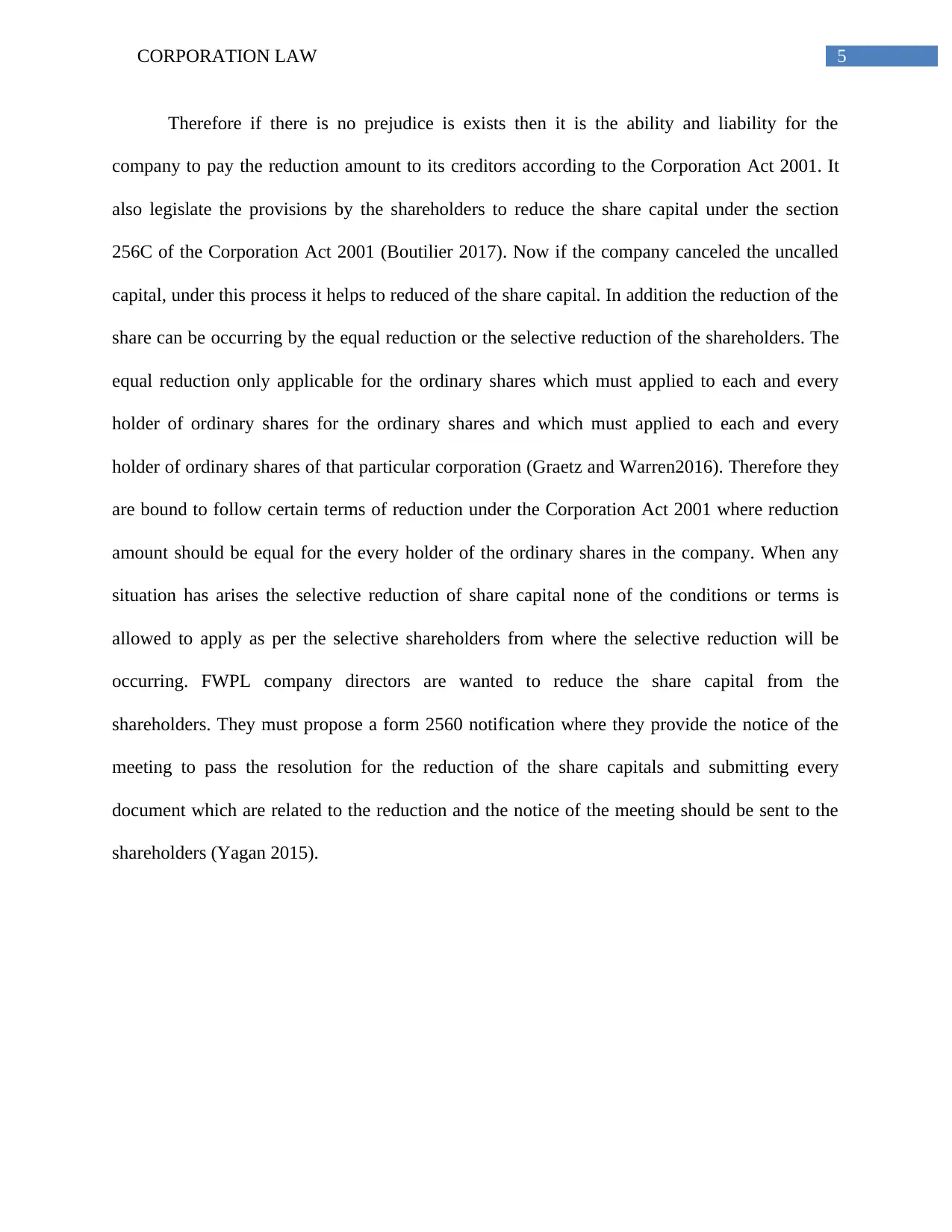
5CORPORATION LAW
Therefore if there is no prejudice is exists then it is the ability and liability for the
company to pay the reduction amount to its creditors according to the Corporation Act 2001. It
also legislate the provisions by the shareholders to reduce the share capital under the section
256C of the Corporation Act 2001 (Boutilier 2017). Now if the company canceled the uncalled
capital, under this process it helps to reduced of the share capital. In addition the reduction of the
share can be occurring by the equal reduction or the selective reduction of the shareholders. The
equal reduction only applicable for the ordinary shares which must applied to each and every
holder of ordinary shares for the ordinary shares and which must applied to each and every
holder of ordinary shares of that particular corporation (Graetz and Warren2016). Therefore they
are bound to follow certain terms of reduction under the Corporation Act 2001 where reduction
amount should be equal for the every holder of the ordinary shares in the company. When any
situation has arises the selective reduction of share capital none of the conditions or terms is
allowed to apply as per the selective shareholders from where the selective reduction will be
occurring. FWPL company directors are wanted to reduce the share capital from the
shareholders. They must propose a form 2560 notification where they provide the notice of the
meeting to pass the resolution for the reduction of the share capitals and submitting every
document which are related to the reduction and the notice of the meeting should be sent to the
shareholders (Yagan 2015).
Therefore if there is no prejudice is exists then it is the ability and liability for the
company to pay the reduction amount to its creditors according to the Corporation Act 2001. It
also legislate the provisions by the shareholders to reduce the share capital under the section
256C of the Corporation Act 2001 (Boutilier 2017). Now if the company canceled the uncalled
capital, under this process it helps to reduced of the share capital. In addition the reduction of the
share can be occurring by the equal reduction or the selective reduction of the shareholders. The
equal reduction only applicable for the ordinary shares which must applied to each and every
holder of ordinary shares for the ordinary shares and which must applied to each and every
holder of ordinary shares of that particular corporation (Graetz and Warren2016). Therefore they
are bound to follow certain terms of reduction under the Corporation Act 2001 where reduction
amount should be equal for the every holder of the ordinary shares in the company. When any
situation has arises the selective reduction of share capital none of the conditions or terms is
allowed to apply as per the selective shareholders from where the selective reduction will be
occurring. FWPL company directors are wanted to reduce the share capital from the
shareholders. They must propose a form 2560 notification where they provide the notice of the
meeting to pass the resolution for the reduction of the share capitals and submitting every
document which are related to the reduction and the notice of the meeting should be sent to the
shareholders (Yagan 2015).
⊘ This is a preview!⊘
Do you want full access?
Subscribe today to unlock all pages.

Trusted by 1+ million students worldwide
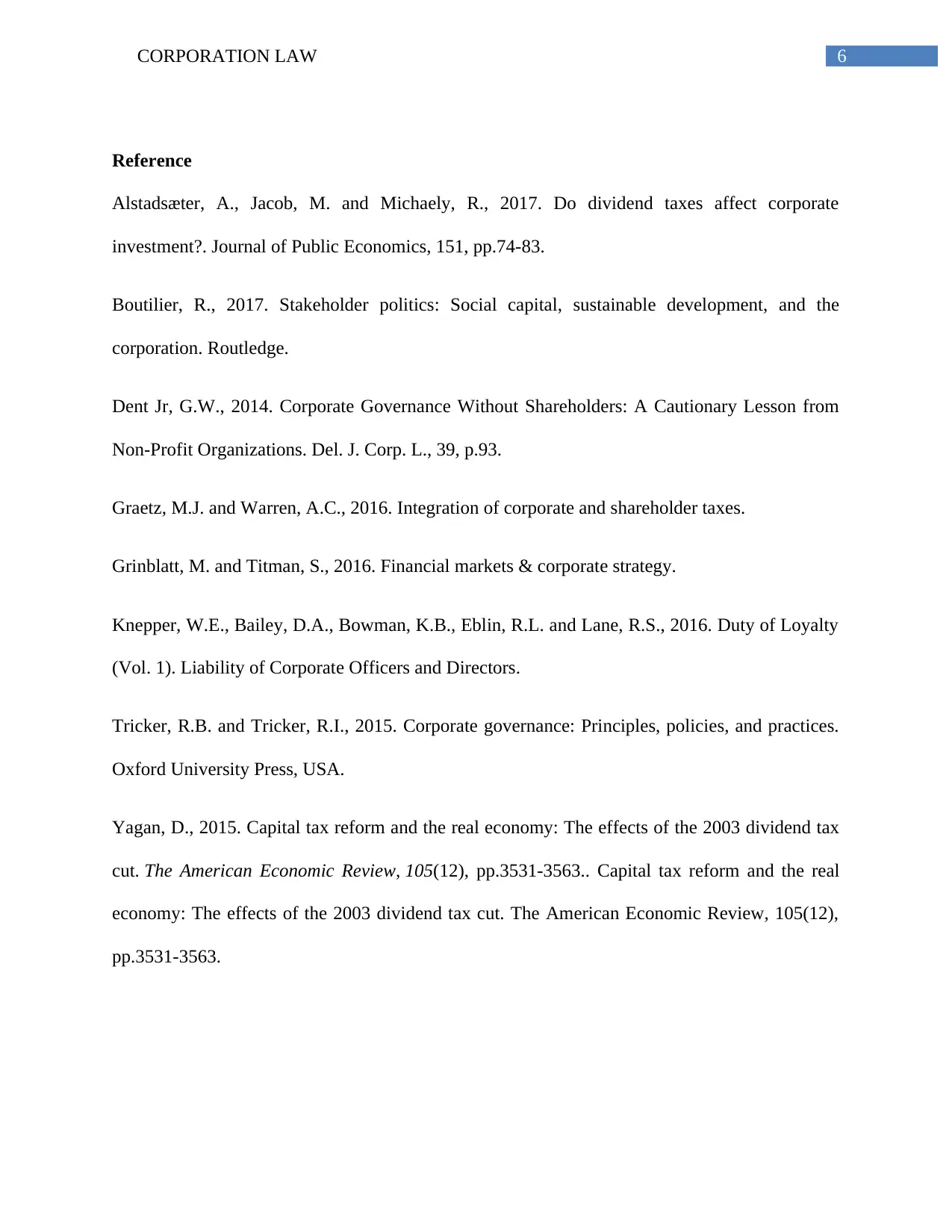
6CORPORATION LAW
Reference
Alstadsæter, A., Jacob, M. and Michaely, R., 2017. Do dividend taxes affect corporate
investment?. Journal of Public Economics, 151, pp.74-83.
Boutilier, R., 2017. Stakeholder politics: Social capital, sustainable development, and the
corporation. Routledge.
Dent Jr, G.W., 2014. Corporate Governance Without Shareholders: A Cautionary Lesson from
Non-Profit Organizations. Del. J. Corp. L., 39, p.93.
Graetz, M.J. and Warren, A.C., 2016. Integration of corporate and shareholder taxes.
Grinblatt, M. and Titman, S., 2016. Financial markets & corporate strategy.
Knepper, W.E., Bailey, D.A., Bowman, K.B., Eblin, R.L. and Lane, R.S., 2016. Duty of Loyalty
(Vol. 1). Liability of Corporate Officers and Directors.
Tricker, R.B. and Tricker, R.I., 2015. Corporate governance: Principles, policies, and practices.
Oxford University Press, USA.
Yagan, D., 2015. Capital tax reform and the real economy: The effects of the 2003 dividend tax
cut. The American Economic Review, 105(12), pp.3531-3563.. Capital tax reform and the real
economy: The effects of the 2003 dividend tax cut. The American Economic Review, 105(12),
pp.3531-3563.
Reference
Alstadsæter, A., Jacob, M. and Michaely, R., 2017. Do dividend taxes affect corporate
investment?. Journal of Public Economics, 151, pp.74-83.
Boutilier, R., 2017. Stakeholder politics: Social capital, sustainable development, and the
corporation. Routledge.
Dent Jr, G.W., 2014. Corporate Governance Without Shareholders: A Cautionary Lesson from
Non-Profit Organizations. Del. J. Corp. L., 39, p.93.
Graetz, M.J. and Warren, A.C., 2016. Integration of corporate and shareholder taxes.
Grinblatt, M. and Titman, S., 2016. Financial markets & corporate strategy.
Knepper, W.E., Bailey, D.A., Bowman, K.B., Eblin, R.L. and Lane, R.S., 2016. Duty of Loyalty
(Vol. 1). Liability of Corporate Officers and Directors.
Tricker, R.B. and Tricker, R.I., 2015. Corporate governance: Principles, policies, and practices.
Oxford University Press, USA.
Yagan, D., 2015. Capital tax reform and the real economy: The effects of the 2003 dividend tax
cut. The American Economic Review, 105(12), pp.3531-3563.. Capital tax reform and the real
economy: The effects of the 2003 dividend tax cut. The American Economic Review, 105(12),
pp.3531-3563.
1 out of 7
Related Documents
Your All-in-One AI-Powered Toolkit for Academic Success.
+13062052269
info@desklib.com
Available 24*7 on WhatsApp / Email
![[object Object]](/_next/static/media/star-bottom.7253800d.svg)
Unlock your academic potential
Copyright © 2020–2026 A2Z Services. All Rights Reserved. Developed and managed by ZUCOL.





